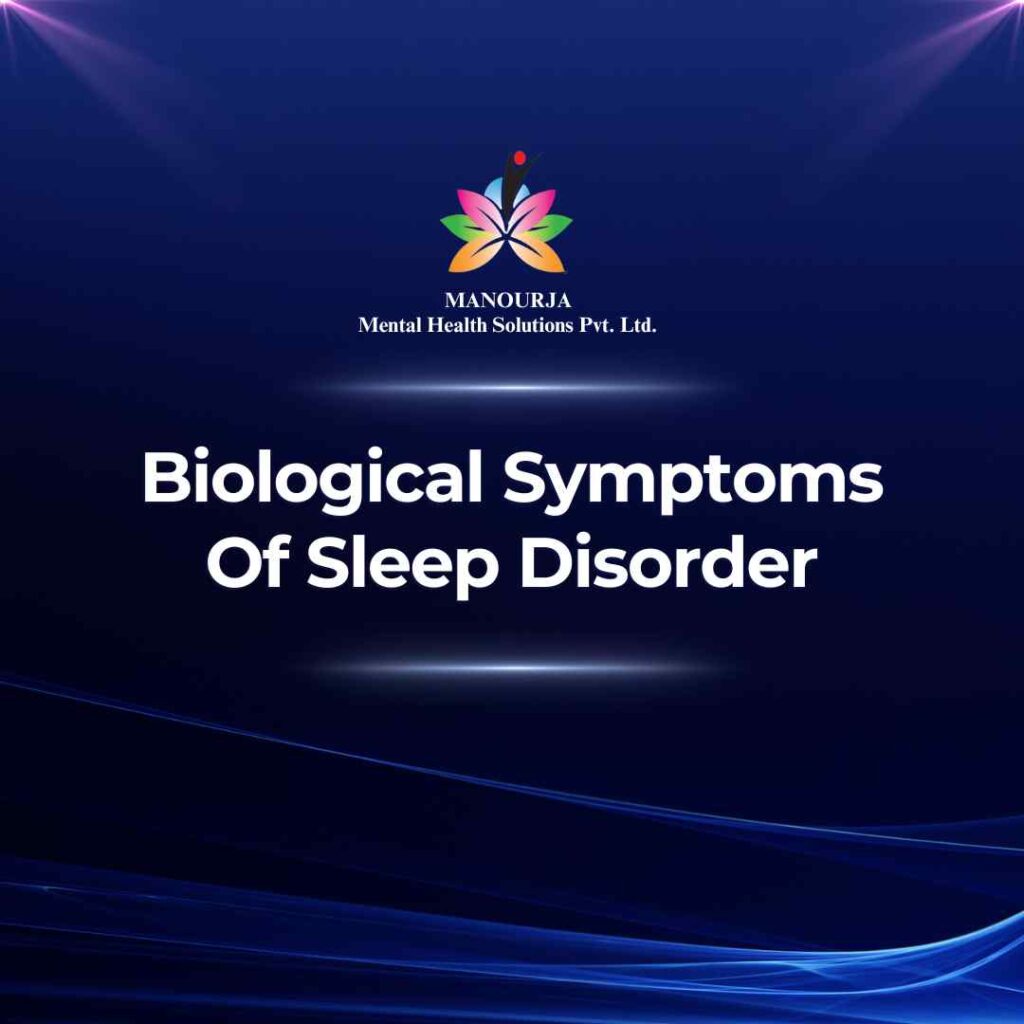Biological Symptoms of Sleep Disorder

Sleep disorders can manifest through a variety of biological symptoms, affecting everything from neurological function to physical health.
Here’s a closer look at some of the biological symptoms commonly associated with sleep disorders:
- Excessive Daytime Sleepiness: One of the most common symptoms of sleep disorders like narcolepsy and sleep apnea is feeling excessively sleepy during the day, despite getting an adequate amount of sleep at night. This can interfere with daily activities and increase the risk of accidents.
- Difficulty Falling or Staying Asleep: In conditions such as insomnia, individuals may struggle to fall asleep or stay asleep through the night. This can lead to significantly reduced sleep time and can affect a person’s health over time.
- Disrupted Sleep-Wake Cycle: Many sleep disorders disrupt the natural circadian rhythm, which is the internal process that regulates the sleep-wake cycle over a 24-hour period. This disruption can lead to irregular sleep patterns and a host of related issues, such as hormonal imbalances and mood fluctuations.
- Snoring and Breathing Issues: Sleep apnea is marked by repeated pauses in breathing during sleep, often accompanied by loud snoring. These interruptions can cause frequent awakenings and prevent deep, restorative sleep.
- Restless Legs Syndrome (RLS): This condition causes an uncontrollable urge to move one’s legs while trying to sleep. The sensations are often described as aching, tingling, or burning, leading to discomfort and disruption of sleep.
- Physical Fatigue: Chronic sleep deprivation from any sleep disorder can lead to persistent fatigue, making it difficult to perform daily tasks and reducing overall quality of life.
- Cognitive Impairment: Poor sleep can affect cognitive processes including memory, concentration, decision-making, and problem-solving skills.
- Mood Disturbances: Sleep disorders often lead to mood swings, irritability, or symptoms of depression and anxiety, stemming from inadequate or non-restorative sleep.
- Increased Heart Rate and Blood Pressure: Especially in disorders like sleep apnea, the body’s struggle to breathe properly can result in cardiovascular strain, leading to elevated heart rate and blood pressure during sleep.
- Weight Gain and Metabolic Issues: Poor sleep can affect the body’s metabolism and has been linked to weight gain, obesity, and an increased risk of diabetes.
These biological symptoms can be indicators of underlying sleep disorders, necessitating medical attention to properly diagnose and treat the condition. For those experiencing such symptoms, consulting with a healthcare provider is important to determine the cause and appropriate treatment options.
At MANOURJA, we believe in the transformative power of counseling. Our experienced therapists offer a safe and supportive space where you can explore your thoughts, emotions, and challenges. Through personalized counselling sessions, we’ll work together to develop coping strategies, build resilience, and achieve lasting positive change. Discover the path to a healthier, happier you with MANOURJA counselling services.
MANOURJA Rehabilitation Services
At MANOURJA, we’re dedicated to helping you in rebuild your life, after difficult times. Our rehabilitation services focus on understanding what you need to move forward, whether you’re recovering from addiction, trauma, or any psychological – social challenges. We create personalized plans, that are all about helping you, regain your strength and find hope again. With a caring team by your side, you’ll have the support to make real progress and take steps toward a brighter, healthier future.
